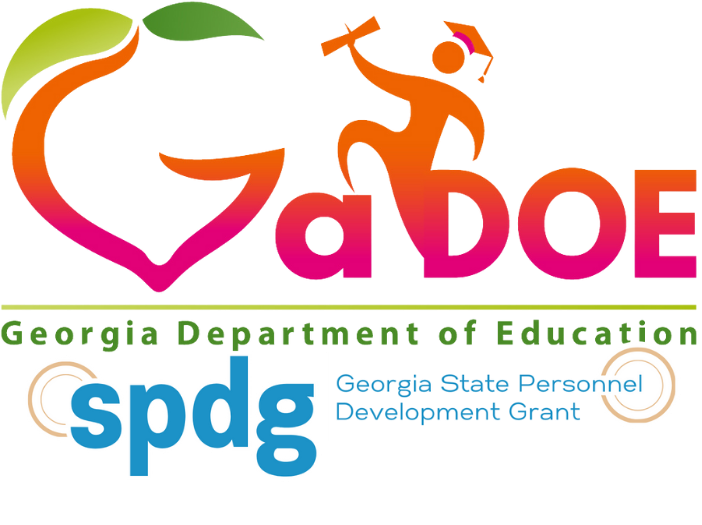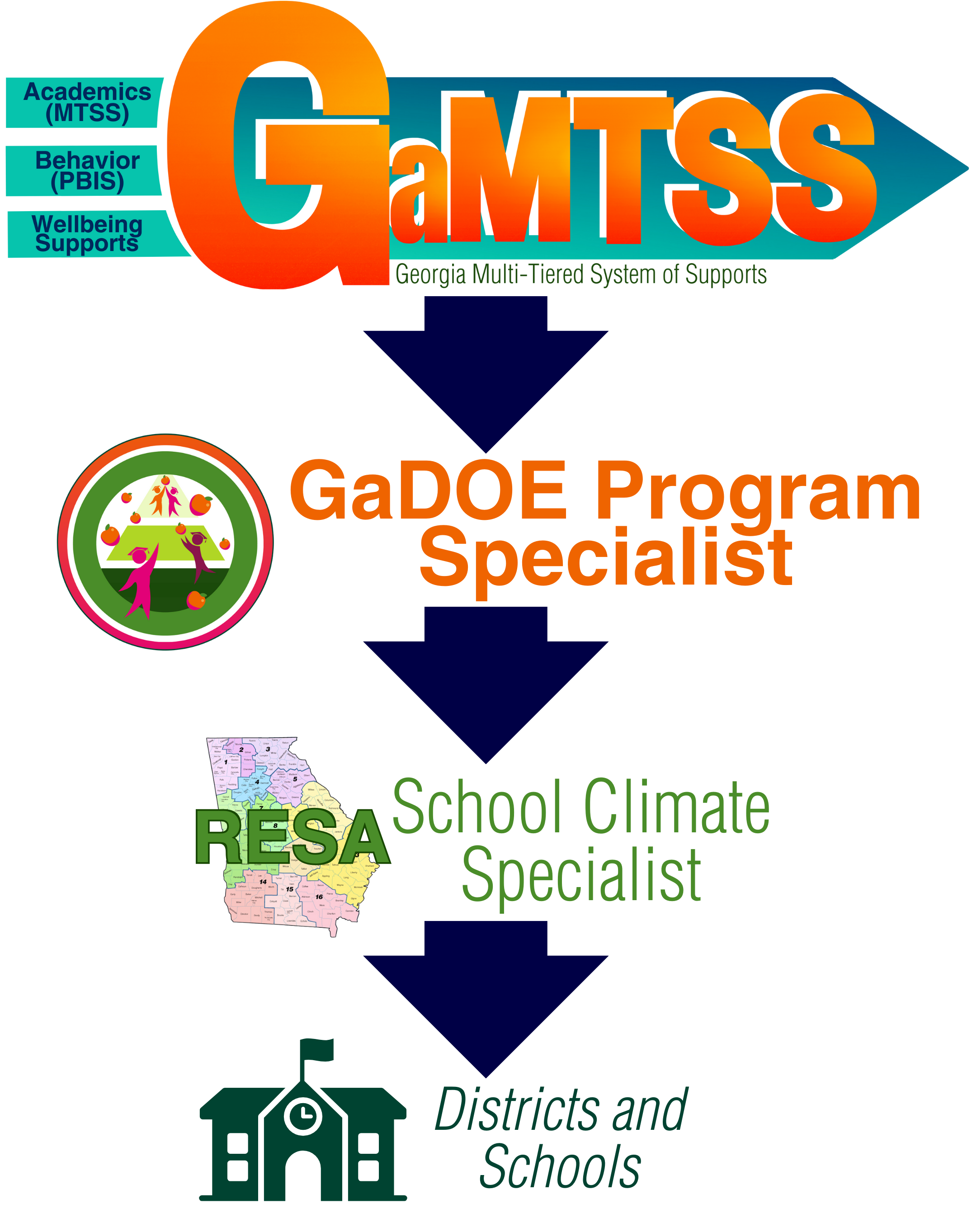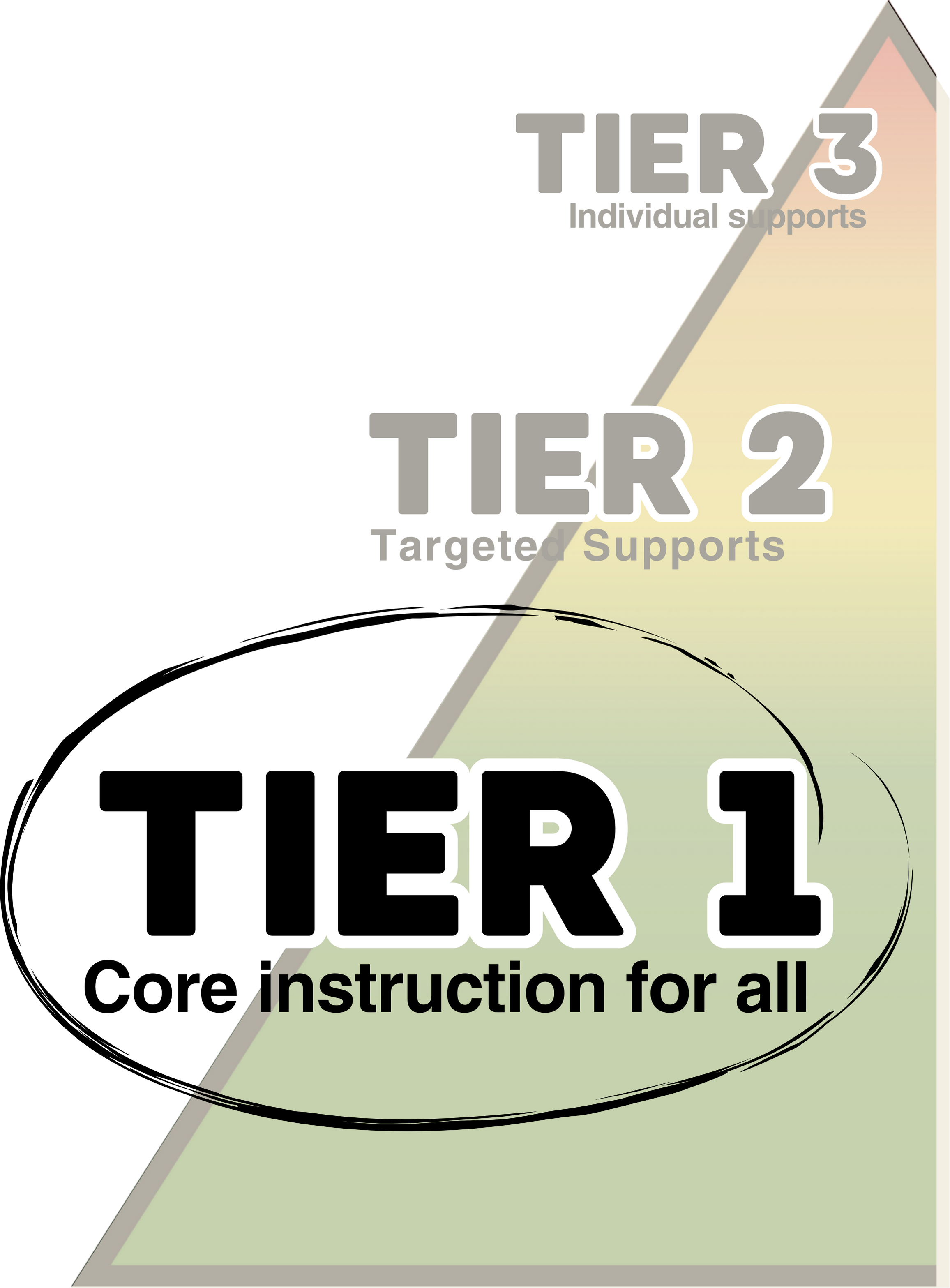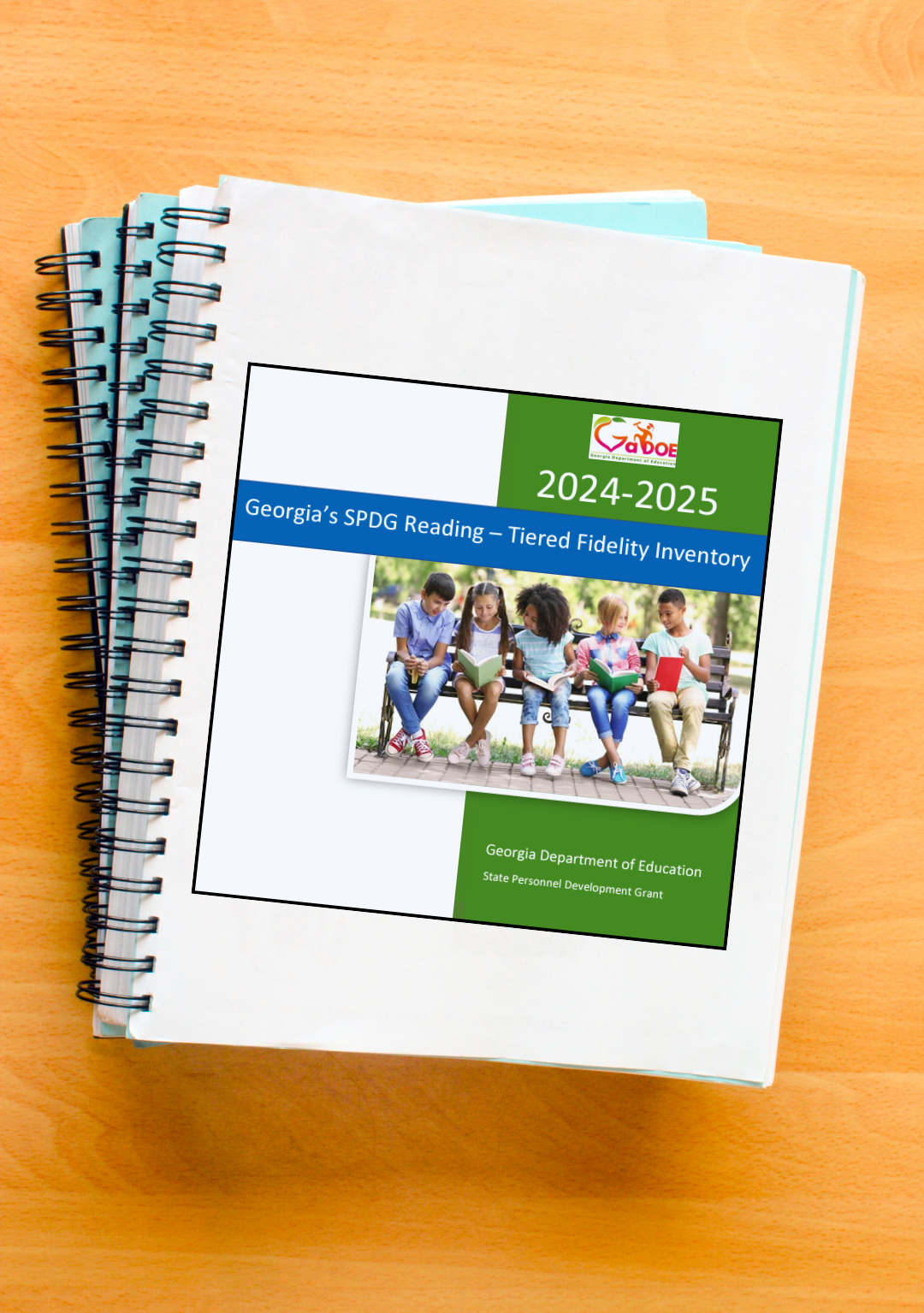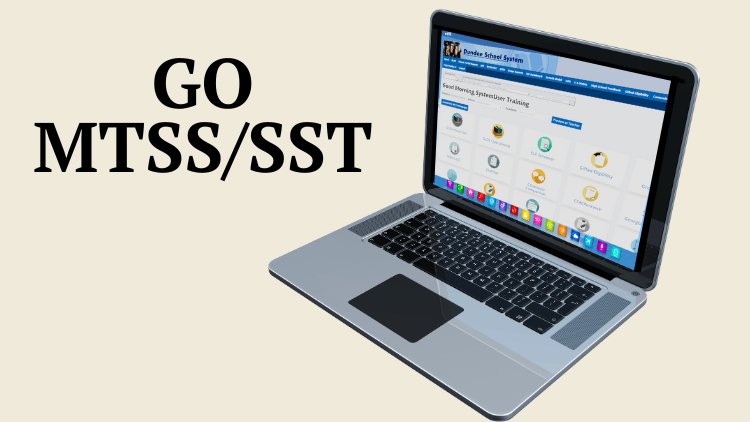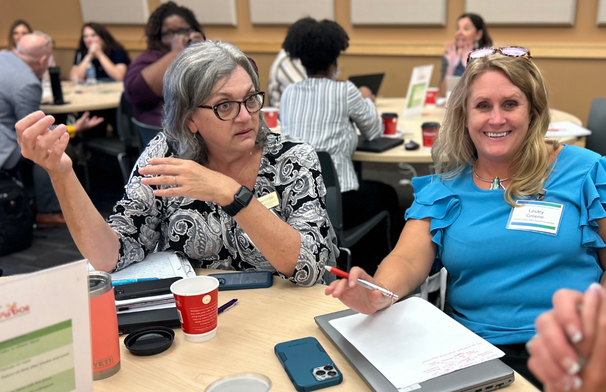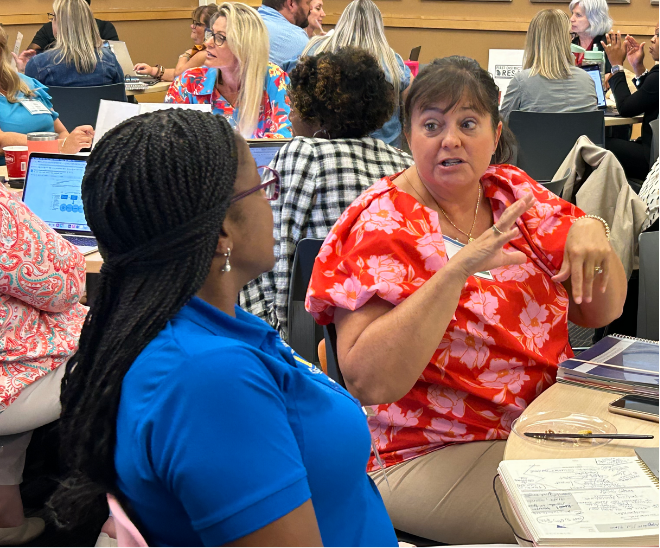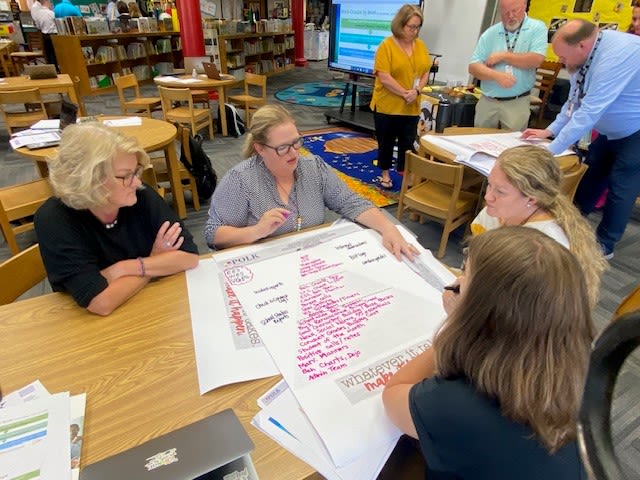A Peach of a Process
Streamlining SPDG Work to Improve Literacy Outcomes in Georgia

Rooted in the Implementation of an Effective Multi-Tiered System of Supports
The Georgia State Personnel Development Grant (SPDG) has the primary goal of improving reading outcomes for students in grades 4 – 8, including students with disabilities. This goal is addressed through high quality professional learning and coaching, facilitating the implementation of an integrated framework known as the Georgia Multi-Tiered System of Supports (GaMTSS). GaMTSS includes priorities such as the use of a data-driven decision making process, strong teaming practices, and multi-level prevention. While the focus of SPDG is on improving literacy outcomes, the integrated nature of GaMTSS also allows the team to address academic, behavioral, and wellbeing concerns.
Infrastructure for Performance
The district infrastructure to support GaMTSS is established and sustained by a District Leadership Team (DLT). The DLT can be an existing team with diverse representation and varied perspectives that engages in ongoing data-based decision making and leads the work of district improvement. The DLT leads the implementation of GaMTSS district-wide and fosters sustainability by (1) aligning implementation with the district mission, vision, and improvement goals, (2) budgeting and allocating resources, (3) informing policy and guiding practice, (4) developing workforce capacity, (5) monitoring progress and removing barriers to achieve goals, and (6) communicating alignment, progress, and outcomes with stakeholders.
Cascading Supports Model
Cascading supports, designed to build district capacity from the state GaMTSS team in partnership with Regional Educational Service Agency (RESA) School Climate Specialists, allows for targeted coaching and timely support. Districts and schools engage through an effective data-based teaming structure to drive continuous improvement through the implementation of GaMTSS.
Tier 1 Impact
Tier 1 is considered the most important level of support because teachers can make a significant impact on the greatest number of students, including those with disabilities. The design and implementation of SPDG meets the needs of students with diverse literacy needs. Also, SPDG provides a foundation for successful supplemental literacy interventions, creating an opportunity for collective efficacy among teachers. Through the professional learning, coaching, and implementation of Georgia Standards of Excellence as well as GaMTSS, school teams strengthen Tier 1 instruction.
“Seeing where my schools and districts are now, one year into our SPDG journey, the look back is exciting. The most rewarding part is realizing what is ahead for the SPDG cohorts. As a result of their hard work and dedication to assuring that all students have access to a strong Tier 1 focused on adolescent literacy, success is inevitable.”
Program Specialist, Aimee Hayes

Harvesting Positive Outcomes
Georgia's SPDG Fidelity Tools
District Fidelity Tool (DFT)
The DFT was designed for school districts to support implementation of GaMTSS at a systems level and serve as a road map to integrate academics, behavior, and wellbeing into one tiered system of supports. It can be utilized by the DLT to (1) measure fidelity of district-wide, systematic implementation of GaMTSS, and (2) monitor progress towards effective, efficient, and sustained use of GaMTSS for continuous improvement.
School Fidelity Tool (SFT)
The SFT was designed to support the implementation of GaMTSS. Leadership Teams can utilize the GaMTSS School Fidelity Tool (SFT) in two different ways: (1) to measure the fidelity of an existing integrated tiered system of supports, or (2) to serve as a road map for schools seeking to integrate academics, behavior, and wellbeing into one tiered system of supports.
Georgia's SPDG R-TFI
As with any new initiative, it is helpful to have a guide for the work of improving adolescent literacy. Georgia’s SPDG team developed a Reading Tiered Fidelity Inventory (R-TFI), adapting it from the Michigan MiMTSS Reading –TFI. The tool is used as a roadmap for literacy improvement as well as a means of self-reflection, needs assessment, and fidelity. The instrument is facilitated by a Reading Instructional Coach, and data is collected for all participating SPDG cohort schools.
GO MTSS/SST
GO MTSS/SST is a free data platform designed by the GaDOE team to support all Georgia public schools. It guides the documentation of students receiving tiered interventions, and it tracks the progress and maintains a record of a student's growth, making it integral to SPDG schools. Through this platform, school teams and teachers monitor and maintain a record of a student’s progress with literacy interventions. This instrument also contributes to data-based decision making and acts as a professional learning tool by guiding preservice and current teachers through the documentation process.
The SPDG Research and Evaluation Coordinator provides training sessions, holds office hours, and manages GO MTSS/SST technical assistance requests for all districts. The Coordinator also works with the GaDOE Information Technology Division to integrate platform enhancements based on user feedback. Currently, more than 40,000 student profiles are included in the platform, and over 138 districts utilize the platform. Trainings for new users continue throughout the school year to accommodate implementation.
Professional Learning
Professional Learning (PL) and coaching support are at the heart of the Georgia SPDG work. PL activities are designed with a focus on improving academic, behavioral, and wellbeing outcomes through GaMTSS with the goal of increasing literacy outcomes, including students with disabilities in grades 4-8. GaDOE Program Specialists and RESA School Climate Specialists deliver training and coaching to key personnel within SPDG cohorts, focusing on the five essential components of GaMTSS: Data-Based Decision Making, Teaming, Evaluation, Multi-Level Prevention, and Infrastructure. Using these foundational aspects of pedagogy, districts and schools ensure instruction is meeting the needs of all students and make adjustments as indicated by data.
Cohort 1 consists of 6 districts and 13 schools across Georgia. Their initial year of support included over 244 educators receiving PL over the course of the year. Cohort 2, which includes 5 districts and 9 schools, initiated their work in May of 2024. Data collected via anonymous survey of the PL participants throughout the past year indicates 95% or higher agree or strongly agree the training was beneficial. One participant reported, “I thought it was excellent. The presenters were engaging and presented clear information no matter the knowledge level of the participant. This was a great foundational training that could benefit anyone participating.” Another shared, “The time to discuss various topics with state, RESA, and district leaders was so beneficial. I am walking away with multiple 'AHA' moments and action items to share with my district team.”
Coaching Corners are held after PL sessions to give district leads additional time to collaborate and clarify the content with the GaDOE Program Specialists. One participant remarked, "The Coaching Corner was so helpful. I enjoyed hearing from other schools in my area about what they are doing and how they are making GaMTSS work in their districts."
"SPDG and GaMTSS have provided the framework for us to improve."
Michael Wilborn, Dade Middle School Instructional Coach

Sweet Partnerships
Parent to Parent
SPDG works with Parent to Parent of Georgia to support families of students with disabilities by providing information and resources. Through social media posts, descriptive videos, and learning plans, the SPDG team creates educational opportunities for parents and guardians. Monthly small group trainings further support the partnership and cultivate an environment of understanding and collaboration. Parents feel "better prepared for navigating the Child Find assessment process" and "emotionally supported" after participating in Parent to Parent events.


Early Childhood Connection
Georgia SPDG supports a strong educational connection with parents and students in the early stages of life. Part C Parent Educators enable the development of this positive connection by acting as mentors and liaisons and helping families understand Georgia’s primary service provider intervention model. As parents of children with disabilities who have firsthand experience with Babies Can't Wait, Georgia’s early intervention system, Parent Educators locate resources and peer support for parents, apply for funding and clinical services, help to navigate the transition into Part B services, and promote language and literacy within the home.
Since 2023, the Part C Parent Educators have provided more than 400 hours of direct service, served over 200 families, coordinated community-based events, and facilitated training opportunities. Their lived experience allows Parent Educators to connect with families in a way that builds trust and demonstrates what is possible when high quality early intervention services are provided between ages 0-3.
"SPDG training has equipped Dade Middle School with the structures necessary to best assess our Tier 1 practices as well as to use data to impact our practices with all tiers."
Michelle Doane-Beeler, Dade Middle School Principal

A Bushel and a Peck
Cohort 1: Rockmart Middle School
Rockmart Middle School (RMS) experienced the benefits of the SPDG process over the past two years. As a member of Cohort 1, RMS started working on improving Tier 1 and a tiered supports system in 2023. Through focused coaching and effective professional learning opportunities, teachers have seen significant gains in student literacy, and RMS is now recognized as a model school within the district. Specifically, the African-American and Students with Disabilities subgroups have seen drastic improvements through increased fidelity and strengthening of Tier 1 practices.
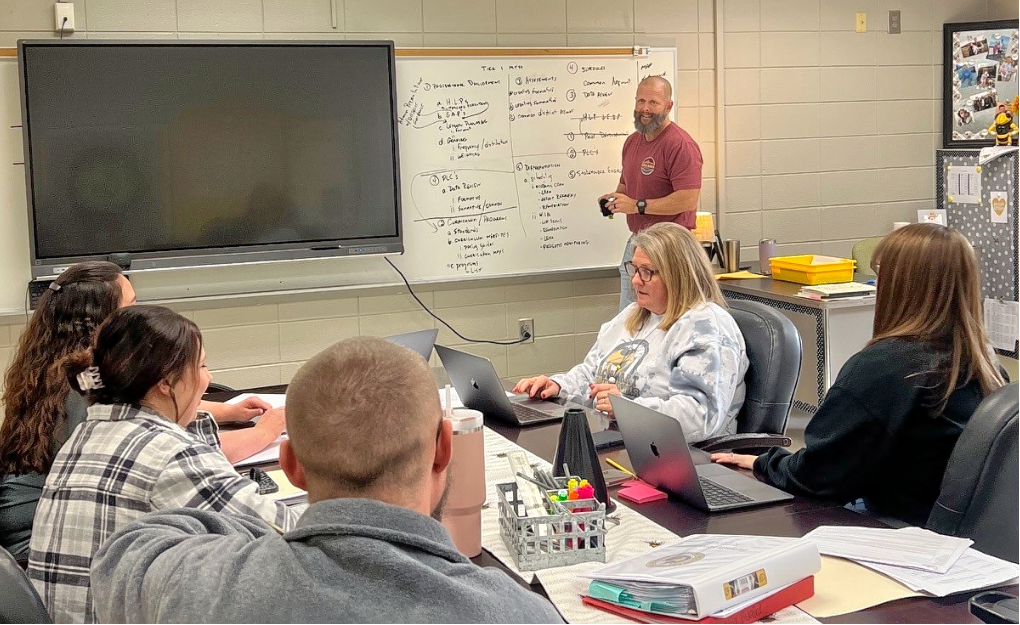
"While we had processes in place, the SPDG coaching allowed us to ensure that these processes were implemented with consistency and fidelity. I am not sure we would have discovered this need without the SPDG steps and coaching."
- Chris Loveless, Principal
Cohort 2: Irwin County
Irwin County started their work with the SPDG team in May of 2024, and they are already reaping the benefits of professional learning. The biggest impact the Irwin County district team has experienced is the transition to making instructional decisions based on integrated data. As a small district, often times the human element impedes the process of determining needs and identifying weaknesses within the instructional environment. Through a consistent, holistic process, Irwin County digs deep into the data to identify root causes and devise specific plans for improvement.
